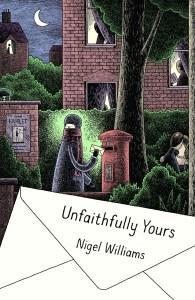I had the week from Hell last week. No, don’t ask, I’m not in a place where I can talk about any of it yet, although I can say it included in its minor reaches a rushed trip to the dentist and being attacked by trolls in an online discussion. Not events designed to enhance one’s joie de vivre. In consequence I am terribly behind with online commenting and not likely to catch up just yet. Many apologies.
But to keep us ticking over, a couple of reviews:

This book reminded me so much of a rather well-known Mike Leigh play, Abigail’s Party, a waspishly black social comedy from the era of brown and orange carpets and martinis that contained a tinned olive speared on a cocktail stick. There is something quintessentially British about this sort of thing, where we find appalling people quite funny and events hover around the tragicomic in a farcical way. I was afraid when I began it that I would find the book a bit dated and stage-y. But Nigel Williams is a very experienced writer, and he keeps plugging away at his characters, digging beyond their shallow facades to find the deeper, more authentic and interesting emotions beneath. It is also extremely well plotted, with the exchange of letters being used in rather clever ways to mislead the reader. So I enjoyed it a lot more than I initially thought I would, and admired its skill. You’ve got to be prepared to laugh at unpleasant people, though, and to enjoy reading a rant.

Over the course of that week, though, events will occur that will change everything. I have to say that the atmosphere of creeping menace in this book is brilliantly done. Smyth never stops reminding the reader with little signs here and there, that this is a place where great evil occurs out of the most supreme disrespect for the life of another person, the dark flip side of indolent freedom. It’s a clever touch to have Martin in the police, brought in as a consultant whose job is to reform and modernise. Has he been corrupted by the islands – though his lack of ethics takes a different form – and therefore what happens to him is a form of justice? Or is it simply that he is an accident waiting to happen? This was a very good book – terrible, compelling and shocking, but not without firm belief in the fundamental resilience of humanity. Having read it, I can assure you I will never, ever set foot in either Trinidad or Tobago, pretty as they may be. I’ll read Amanda Smyth again, though.
